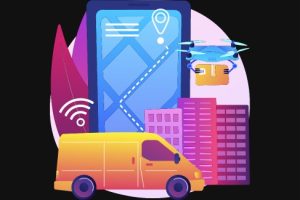
The logistics industry is constantly evolving, with new technologies and innovations shaping the way goods are transported and delivered. As we navigate major advances in technology, it’s important to stay up-to-date on the latest trends and developments in the industry. In this article, we will discuss the top trends in logistics for the coming year, including the rise of automation, the growth of e-commerce, and the increasing importance of sustainability and autonomous delivery.
We predict 2023 will see a rise in Logistics automation. Automated logistics systems are becoming increasingly sophisticated, offering a wide range of benefits, including increased efficiency, reduced costs, and improved accuracy. Companies are investing in automation to streamline their operations and improve the speed and reliability of their deliveries. For example, many companies are using automated systems to manage inventory levels, track shipments, and monitor delivery times, helping to ensure that goods are delivered on time and in the right condition.
There have been immense improvements in terms of logistics data and analytics. Companies are collecting vast amounts of data on their operations and are using this information to make informed decisions and improve their operations. For example, companies are using data analytics to optimize routes, reduce delivery times, and improve the accuracy of their operations. By using data and analytics, companies can make informed decisions that can help to reduce costs, improve efficiency, and enhance customer satisfaction.
E-Commerce is a major tool furthering Logistics growth. The rise of online shopping has had a profound impact on the logistics industry, as companies strive to meet the demands of online customers for fast and reliable deliveries. To meet these demands, companies are investing in new technologies, such as drones and autonomous vehicles, to help speed up delivery times and reduce costs. In addition, many companies are also turning to new solutions, such as same-day delivery and in-store pickup, to help customers receive their orders as quickly as possible.

Autonomous delivery has been a hot topic in the logistics industry for several years now, with companies around the world exploring the potential of drones, robots, and self-driving vehicles to revolutionize the way goods are transported and delivered. The future of autonomous delivery is shaping up to be one of the most transformative trends in the logistics industry, and its impact on the sector is expected to be far-reaching.
In the Logistics industry, autonomous delivery has the potential to radicalize efficiency. Autonomous delivery systems are designed to operate 24/7, without the need for breaks or downtime, which means that they can handle more deliveries in a shorter amount of time. In addition, autonomous delivery systems can be programmed to optimize routes and delivery times, reducing the time and distance required to complete deliveries. This can lead to significant cost savings, as companies no longer need to pay for fuel, labor, or other expenses associated with human-driven delivery systems.
These autonomous delivery systems are equipped with advanced sensors and navigation systems, which help to prevent accidents and ensure the safe delivery of goods. In addition, autonomous delivery systems are not subject to the same risks as human drivers, such as fatigue or distractions, making them a safer option for deliveries. As a result, companies can reduce the risk of accidents and liability, and ensure that their deliveries arrive in a safe and secure manner.
The increasing importance of sustainability is also a factor that is driving the adoption of autonomous delivery in logistics. Autonomous delivery systems are more energy-efficient than human-driven systems, as they do not require fuel or other resources to operate. In addition, autonomous delivery systems can be programmed to minimize emissions and reduce their environmental impact, helping companies to reduce their carbon footprint and contribute to a more sustainable future.
Further, many companies are investing in green technologies, such as electric vehicles and renewable energy, to reduce their carbon footprint. Others are turning to sustainable packaging solutions, such as biodegradable materials, to minimize waste. When companies embrace sustainability efforts, they’re not only reducing their environmental impact, but also improving their reputation and attracting customers who are looking for environmentally responsible products.
The growth of smart cities is another trend that is shaping the future of autonomous delivery and its impact on logistics. As cities become more connected and digitized, they are providing new opportunities for autonomous delivery systems to operate in urban environments. For example, smart cities can be equipped with sensors and other technologies that can help autonomous delivery systems to navigate around obstacles, avoid collisions, and deliver packages in a safe and efficient manner. By leveraging smart city technology, companies can improve the speed and reliability of their deliveries and help to reduce traffic congestion and improve air quality in urban areas.
From increased efficiency, improved safety, autonomous delivery, the growth of e-commerce and the increasing importance of sustainability, the trends shaping the industry are clear. Companies that embrace these trends and invest in new technologies and innovations will be well positioned to succeed in the future.
To learn more about how Corrigan Logistics is integrating cutting edge technology into our operations, contact us today!


